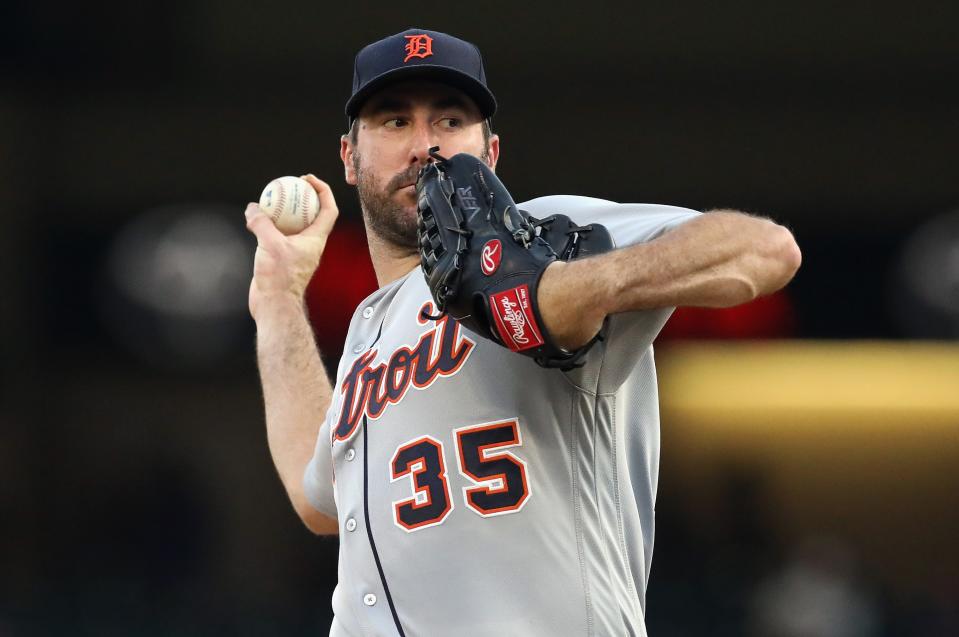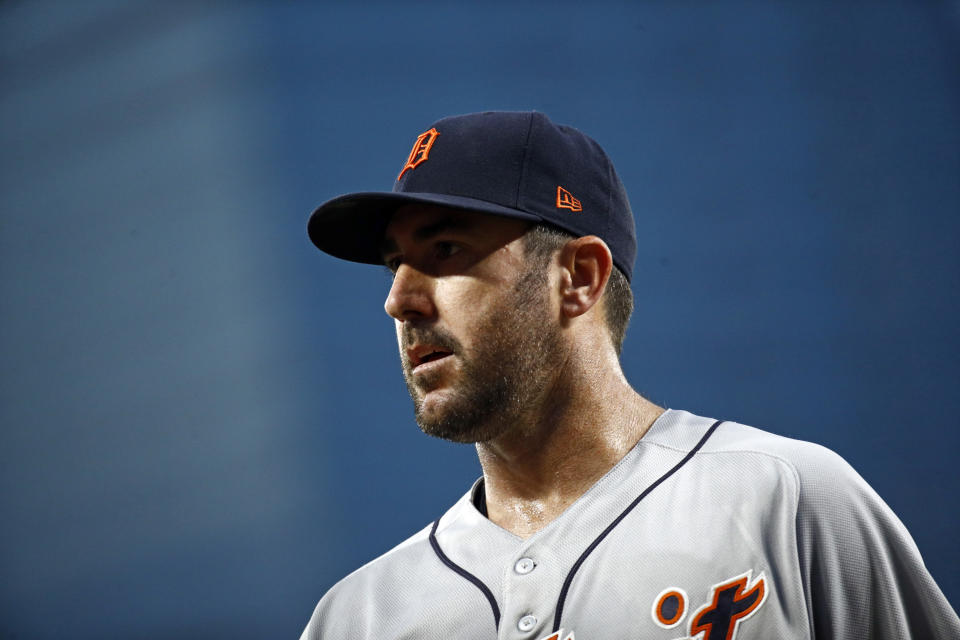Sources: Trade market for Justin Verlander at standstill
With two weeks to go until the real trade deadline, the market for Justin Verlander has ground to a standstill, the reasons threefold: the lack of clarity by the Detroit Tigers on their direction, the slow-playing of interested teams and Verlander’s choice not to pursue a deal through public or backchannel lobbying.
Plenty of time remains for each prong to resolve itself and a trade to materialize, major league sources familiar with the situation told Yahoo Sports, though the latter two depend almost directly on the first. In an era when on-the-fly rebuilds are passé, full tear-downs preferred and a compelling case exists for Detroit to blow up its core, competing executives and those with whom the Tigers have spoken about trades said they can’t figure out Detroit’s plan.
Perhaps, opposing executives muse, it is strategy to hold onto Verlander and second baseman Ian Kinsler into the winter and re-assess after outfielder Justin Upton makes a decision whether to opt out of the final four years and $88 million of his deal – a choice looking likelier by the day. Without Upton, the Tigers’ payroll could dip under $150 million after starting this season at $199.8 million, and shedding the remaining two years and $56 million on Verlander’s deal would go a long way to the austerity late owner Mike Ilitch never considered.

Ilitch’s willingness to spend like a big-market team drove the Tigers to perennial excellence over the past decade, but a 53-67 record and the offensive collapse of Miguel Cabrera, who’s locked in for another six years and $192 million, portends a grim future, particularly considering the mediocre state of the Tigers’ farm system.
Dealing Verlander would, at very least, represent an opportunity to recoup some talent in a deal, though the Tigers’ asking price, according to sources, has been exorbitant. In one discussion, a source said, the Tigers suggested that if a team wanted Verlander, perhaps it could take on the remaining three years and $74 million of Jordan Zimmermann’s deal. Tigers GM Al Avila denied that, saying the Tigers’ baseball-operations department never discussed the possibility of pairing Zimmermann in a Verlander deal.
Those interested in Verlander, who turns 35 before next season, would be getting a version not nearly as dominant as last season, when he should have won the American League Cy Young Award, but still a well-above-average starter. In 151 innings this season, he has struck out 150 batters. With a walk rate higher than he has posted in a decade and a predilection for allowing home runs, though, his ERA is 4.11.
Understandably, the Houston Astros and Chicago Cubs, two teams that have shown interest in Verlander, have pause over the prospect of dishing out $28 million a year to a right-hander in his mid-30s with 2,500 innings of wear and tear. At the same time, with Yu Darvish, Jake Arrieta and Johnny Cueto the best free agent pitchers available this offseason, the prospect of paying Verlander for only two years as opposed to the free agents at least four doesn’t render Verlander’s contract altogether unappealing.
Houston certainly has the prospects to land Verlander, or even to get the Tigers to pay down the deal, which they’ve shown a willingness to do, according to sources. The Astros also are wary of making a move for the wrong reasons – either to placate the players, whose disappointment at their July 31 deadline inactivity was palpable, or act as some sort of reaction to their recent on-field troubles, which, at this juncture, don’t look to be altogether problematic, especially with their AL West lead still at 12 games.
The Cubs are a more interesting case. While they haven’t held recent talks with Detroit about Verlander, the lat injury to Jon Lester may shelve their best starter for weeks – and perhaps into the playoffs. The Cubs could stand pat, hopeful their rotation holds up and Willson Contreras makes a speedier-than-expected injury. Or they could get Verlander, a deal that would serve two purposes.
Barring an unforeseen cratering of Arrieta’s market, Chicago will not re-sign him this offseason. The Cubs could chase Darvish. They could hope Shohei Otani posts and decides to join them. Or they could get Verlander for the playoff drive this season and a rotation filler for the next two seasons. It’s an appealing idea for the Cubs, who before the trade deadline flirted with the possibility of getting Verlander but ended up trading with the Tigers to acquire reliever Justin Wilson and catcher Alex Avila – a move that turned out to be prescient with Contreras’ injury.
One question for Chicago, particularly as the Tigers try to strike a hard bargain for Verlander, is whether the Cubs have the prospect capital to satiate Detroit. Avila is loath to deal Verlander just to deal him, lest it look like the organization gave away its best all-time pitcher in a salary dump.

A similar feeling strikes Verlander when he assesses the situation. Yes, he doesn’t have a World Series ring and wants one. And, yes, if the right situation came along, he might be inclined to waive his no-trade clause and accept a deal. But Verlander’s respect for Detroit and its fans makes it a near-certainty he won’t request a trade, sources said.
Should the Tigers agree now is the right time to deal him, Verlander would be open-minded. Like everyone, he recognizes they’re at a crossroads – that they listened, for example, when Atlanta made a run at 24-year-old starter Michael Fulmer in late July, according to sources. Smart teams listen to everything, so that’s not a sign of the Tigers playing for now or building for the future, but the implication is that a good enough deal may turn them in the selling direction sooner than later.
For the progress of James McCann and the surprise that is Mikie Mahtook, it’s tough to envision the Tigers having enough to make a run at Cleveland in the AL Central next year, particularly if Upton opts out. It’s why the Astros, Cubs and any other team that might want to get back into the Justin Verlander sweepstakes are biding their time: Hard as it may be, the right thing for the Detroit Tigers to do – the smart thing to do – is trade the best pitcher they’ve ever known.


